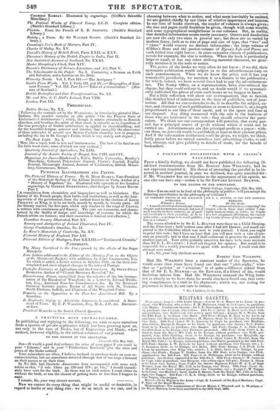A PRACTICAL HINT IMPRACTICABLE.
IN publishing and replying to the following, we wish to save ourselves from a species of private application which has been growing upon us, not only in the case of Books, but of Engravings and Music, when noticed, however slightly; in the critical columns of our journal.
TO THE EDITOR OF THE SPECTATOR.
Clontarf, 27th May 1841.
Sin-It would a good deal enhance the value of your paper if you could in your " Library," and in your " Publications Received," give the sizes and prices of the books noticed.
Your subscribers are often, I believe, inclined to purchase books on your re- commendation, but are sometimes deterred through fear of too large a demand on their purses or on their time. In No. 669, had Deutsche Amaranten been accompanied with some such notice as this, " 2 vols. 12mo. pp. 350 and 378 ; pr. 14s.," I should immedi- ately have sent for the book. As there was no such notice, I must either do without the book, or run the chance of getting more or less than I happen to want.
I remain, Sir, your very sincere servant, — Now we cannot do every thing that might be useful or desirable, ia regard to books or any thing else : we do as much as we can, and in
choosing between what to notice, and what must inevitably be omitted, we are guided chiefly by our views of relative importance and interest. In our lists of books received, the number of volumes is always given; the size and pages could doubtless be given, though with some trouble, and some typographical unsightliness to our columns. But, in reality, that detailed information seems rarely necessary. Octavo and duodecimo are now the only two sizes in general use ; but these are so varied by modern fancy, both as to size of page and size of type, that "8vo" and " 12mo" would convey no distinct information : the large volume of Gibbon's Rome and the pocket-volume of Byron's Life and Poems are each folded into eight leaves : in some extensive classes of publications, novels for example, the size is uniform. When the book is particularly large or small, or has any other striking material character, we gene- rally mention it in the note or notice.
The prices of the books we very often do not know : if we did, their systematic publication would subject us to the advertisement-duty on each announcement. When we do know the price, and it has any remarkable peculiarity, we mention it as a feature in the publication ; for which, indeed, we have several times had to pay the advertisement- tax. The Stamp Office, on a representation, have discontinued the charge, but they could enforce it, and no doubt would if we systemati- cally published the prices of even such books as we happen to know.
But a little reflection will show our correspondent, that to furnish this detailed kind of information is the duty of publishers, not of jour- nalists. All that we can undertake to do, is to describe the subject, na- ture, and character of such publications as seem to deserve it, at a length proportioned to our idea of their merit, and to the space and time at our disposal. Any thing connected with the sale is the business of those who are interested in the sale : they should advertise the parti- culars. We think too our correspondent will perceive, that every pur- suit has a principal source of profit without which it could not be carried on. Advertisements are this principal profit to a paper : with- out them, no journals could he published, at least at their present prices. And if the information desiderated could be given, we might, we think, fairly pause before we turned ourselves into advertising-clerks, to col- lect, arrange, and give publicity to details of trade, for the benefit of booksellers.


























 Previous page
Previous page